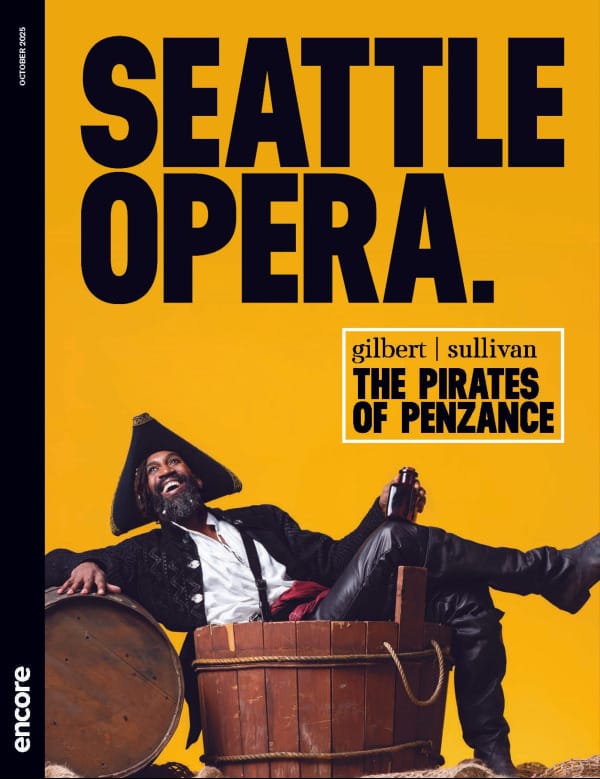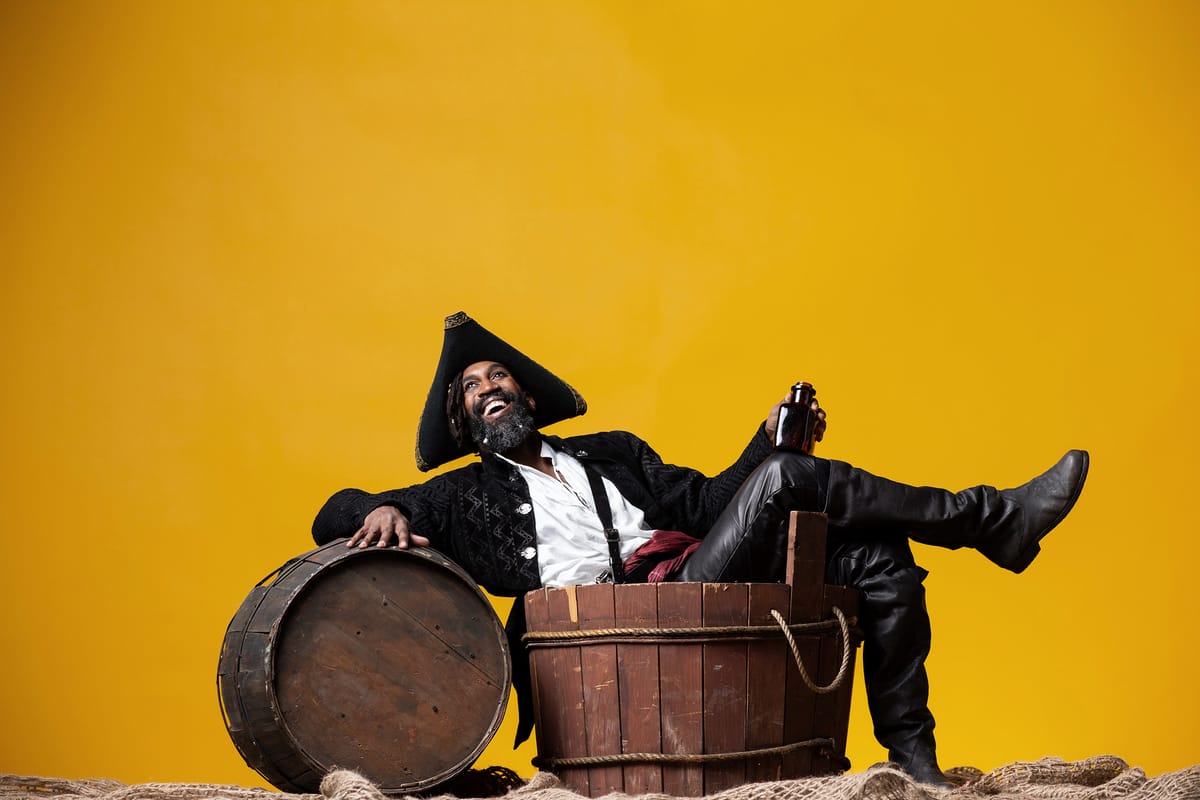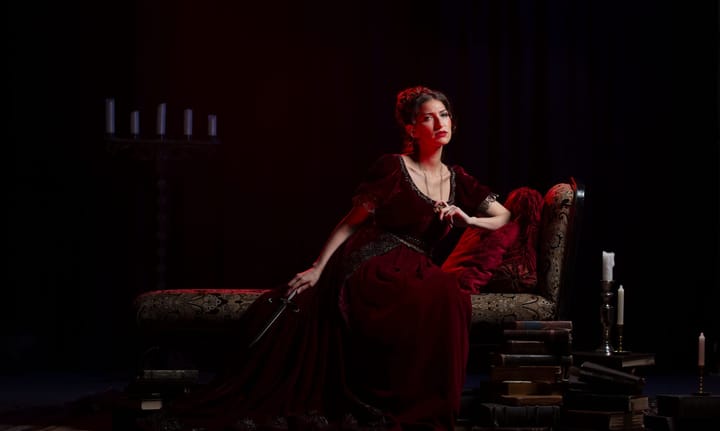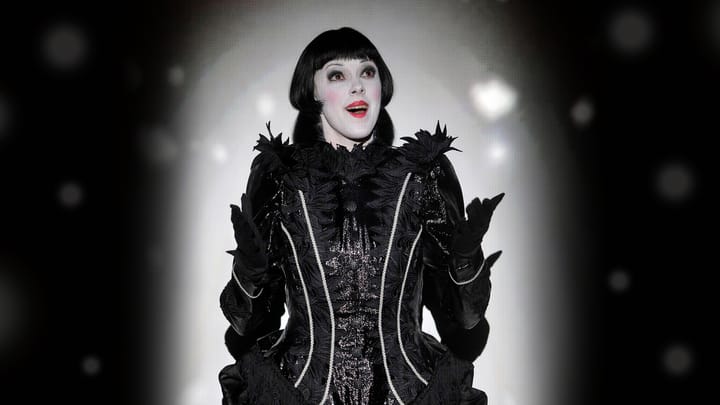October 18 – November 1, 2025 | McCaw Hall
In This Program
- Show Information
- Who’s Who
- Letters
- Features
- Additional Information
Production Sponsors
2025/26 Season Sponsor
4Culture
Production Sponsors
Seattle Opera Foundation
Lesley Chapin Wyckoff
ArtsWA
Microsoft
Performance Sponsors
Dr. Brian A. LaMacchia
(Oct. 28 Student Matinee)
We are deeply grateful to you, Seattle Opera’s 5,300+ Annual Fund donors.
Your passion for opera and contributions at every dollar amount inspire great performances at McCaw Hall, and support engaging activities at The Opera Center and throughout Washington state all season long!
Thank you!
Music by Arthur Sullivan
Libretto by W. S. Gilbert
Premiere: Fifth Avenue Theatre, New York, NY, 1879
Seattle Opera Premiere: 2025
In English with English captions
ACT I: 65 minutes
INTERMISSION: 25 minutes
ACT II: 53 minutes
CONDUCTOR
David Charles Abell †
STAGE DIRECTOR AND CHOREOGRAPHER
Seán Curran †
SCENERY AND COSTUME DESIGNER
James Schuette
LIGHTING DESIGNER
Robert Wierzel
SOUND DESIGNER
Robertson Witmer
WIGS, HAIR AND MAKEUP MANAGER & DESIGNER
Ashlee Naegle
LANGUAGE COACH
Lynn Baker †
CHORUS MASTER
Michaella Calzaretta
ENGLISH CAPTIONS
Jonathan Dean
Cast
(in order of vocal appearance)
SAMUEL
Ilya Silchukou
RUTH
Katharine Goeldner †
THE PIRATE KING
Reginald Smith Jr †
FREDERIC
David Portillo †
EDITH
Tess Altiveros
KATE
Erica Convery †
ISABEL
Elizabeth Peterson †
MABEL
Vanessa Becerra †
MAJOR-GENERAL STANLEY
Thomas Glass †
SERGEANT OF POLICE
Nathan Stark †
ASSOCIATE CONDUCTOR
Bobby Collins †
ASSISTANT STAGE DIRECTOR
Nadja Simmonds †
ASSISTANT LIGHTING DESIGNER
Connie Yun
MUSIC PREPARATION
Michaella Calzaretta
Claire Forstman †
David McDade
ORCHESTRA LIBRARIAN
Jay Rozendaal
PRODUCTION STAGE MANAGER
Jonathan Moore
ASSISTANT STAGE MANAGERS
Quinn Chase
Jamie Kranz
This production of The Pirates of Penzance is an original production of Opera Theatre of St. Louis
Scenery owned by The Atlanta Opera and Palm Beach Opera.
Costumes are the property of Opera Theatre of Saint Louis.
† Seattle Opera Mainstage debut
Opera presentation and production © Seattle Opera 2025.
Copying of any performance by camera , audio, or video recording equipment, and by any other copying device, and any other use such as copying devices during the performance is prohibited.
The Story
The Pirates of Penzance
or
The Slave of Duty
Following a time-honored tradition in British (and continental) theater, Gilbert and Sullivan liked to give their operas secondary titles. G&S aficionados will recognize The Lass That Loved a Sailor, The Peer and the Peri, and The Town of Titipu as alternate names for H.M.S. Pinafore, Iolanthe, and The Mikado, respectively. In The Pirates of Penzance, Frederic frequently reminds everyone he is “The Slave of Duty.”
Act I
Off the coast of England, Frederic, a young man of 21, celebrates the end of his apprenticeship to a band of pirates. Their maid Ruth tells Frederic that when he was an infant, his father requested he be apprenticed to a pilot, but she misheard and brought him to the pirates.
Now that he is no longer a Pirate Apprentice, Frederic believes the Pirate way of life is wicked, and that the crew should consider a respectable lifestyle. Frederic also points out that they are terrible pirates who refuse to harm those who claim to be orphans. The Pirate King claims piracy is more honest than a “respectable” lifestyle.
Frederic prepares to leave the pirate ship and Ruth begs him to take her with him and marry her. Though he is reluctant to marry her, he agrees and they depart. On the beach, they stumble upon a group of beautiful young women. Upon seeing them, Frederic angrily denounces Ruth for leading him to believe that she is beautiful. Frederic asks the girls to help him reform from his pirate life. All reject him except Mabel. She offers Frederic her pity and the two quickly fall in love. The pirates return to storm the beach and capture the girls, intending to marry them.
Mabel’s father, the Major-General, enters and objects to the girls being married against their wills. To save them he claims to be an orphan. The pirates are sympathetic, being orphans themselves, and release the Major-General and the girls.
INTERMISSION
Act II
At the Major-General’s estate, he laments his lie, afraid that he has brought shame upon the family. The girls try to comfort him. As they do, the Police Sergeant arrives and tells them that with Frederic’s help, he is prepared to arrest the pirates.
Frederic considers this an opportunity to atone for a life of piracy. The Pirate-King and Ruth enter and inform Frederic that he was to be apprenticed until his 21st birthday and, as he was born in a leap year on February 29th, he is actually only five years old. The Pirate-King knows Frederic will honor his sense of duty and return to the pirates. Frederic dutifully tells the Pirate King of the impending attack.
Before leaving, Frederic meets with Mabel to tell her he is actually only five years old. They agree to be faithful to each other until Frederic returns. Mabel tells the police that they will have to face the pirates alone, not knowing the pirates are planning an attack of their own.
At the Major-General’s estate, the pirates attack the house. The police leap to defend the Major-General, but are easily subdued. The Sergeant begs the pirates not to kill them in the name of Queen Victoria. Ruth reveals that the pirates are in fact nobility. The pirates free the Major-General out of their sense of loyalty to the Queen. The Major-General, happy to have the girls wed noblemen, offers the pirates their hands in marriage as thanks and everyone celebrates the approaching weddings.
Courtesy of Lyric Opera of Kansas City
Who’s Who
Artists
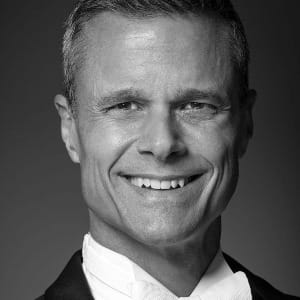
DAVID CHARLES ABELL
Conductor (Provincetown, MA)
Seattle Opera Debut
Engagements: La bohème (Lyric Opera of Kansas City); Porgy and Bess (The Atlanta Opera); The Magic Flute (Opera Philadelphia); Eugene Onegin (Hawaiʻi Opera Theatre); Die Fledermaus, Silent Night (Cincinnati Opera); Sweeney Todd, Carousel (English National Opera)

TESS ALTIVEROS
Edith
Soprano (Seattle, WA)
Seattle Opera Debut: Clorinda, The Combat (’17)
Previously at Seattle Opera: Papagena, The Magic Flute (’25); Ascagne, Les Troyens in Concert (’25); Nana/Market #1/Wajma, A Thousand Splendid Suns (’23)
Engagements: Soloist, Iris Dévoilée (Seattle Symphony); Euridice, L’Orfeo (Tacoma Opera); Mimì, La bohème (Opera Montana); Susanna, The Marriage of Figaro (Opera Idaho); Soldier, The Falling and the Rising (Des Moines Metro Opera, Arizona Opera, Montana Opera, Opera Memphis)

VANESSA BECERRA
Mabel
Soprano (Fort Worth, TX)
Seattle Opera Debut
Engagements: Nuria, Ainadamar (LA Opera); Maria Celeste/Eos, Galileo Galilei (Opera Theatre of St. Louis); Norina, Don Pasquale (Opera Omaha); Adina, The Elixir of Love (Minnesota Opera); Zerlina, Don Giovanni (Arizona Opera); Violetta, La traviata (Berkshire Opera Festival)

MICHAELLA CALZARETTA
Chorus Master (Muscatine, IA)
Seattle Opera Debut: The Elixir of Love (’22)
Michaella Calzaretta made her Seattle Opera debut in 2022 as the company’s new chorus master and head of music staff. Acclaimed for her high standards and superb preparation skills, Calzaretta oversees all musical activities at the company and prepares the chorus for main stage productions. In January 2024, the chorus embarked on their immensely successful first-ever tour to Mt. Vernon and Vashon Island. Recent praise includes “…continues to impress with her first-rate coaching of her singers” (Broadway World) and “The Seattle Opera Chorus…sang exuberantly and expertly” (The Seattle Times). Calzaretta is a doctoral candidate in choral conducting at Indiana University.
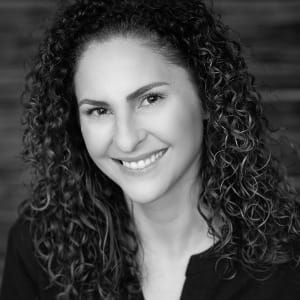
ERICA CONVERY
Kate (Stockton, CA)
Mezzo-soprano
Seattle Opera Debut
Seattle Opera Chorus member since 2017
Engagements: Soloist, Mozart Requiem (Everett Philharmonic Orchestra); Cherubino, The Marriage of Figaro and Mercédès, Carmen (Tacoma Opera)

SEÁN CURRAN
Stage Director & Choreographer (New York, NY)
Seattle Opera Debut
Engagements: Choreographer, Lili Elbe (Santa Fe Opera); Choreographer & Director, PATH (Seán Curran Company); Choreographer & Director, The Pirates of Penzance (Glimmerglass Opera); Choreographer, Julius Caesar, Choreographer & Director, Harvey Milk (Opera Theatre of St. Louis); Choreographer, Io and Léandre et Héro (Opera Lafayette)
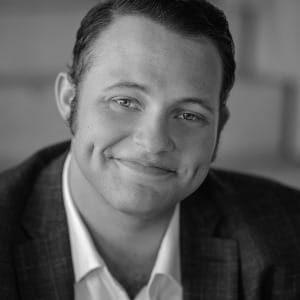
THOMAS GLASS
Major-General Stanley
Baritone (Edina, MN)
Seattle Opera Debut
Engagements: Marcello, La bohème (Opera Theatre of St. Louis); Jack Torrence, The Shining (The Atlanta Opera); Leporello, Don Giovanni (Minnesota Opera); Guglielmo, Così fan tutte (Palm Beach Opera)

KATHARINE GOELDNER
Ruth (Sigourney, IA)
Mezzo-soprano
Seattle Opera Debut
Engagements: Annina, Der Rosenkavalier (The Metropolitan Opera); Geneviève, Pelléas & Mélisande (The Dallas Opera); Larina, Eugene Onegin (Santa Fe Opera); Brigitta, Die Tote Stadt (Théâtre du Capitole de Toulouse); Marcellina, The Marriage of Figaro (Lyric Opera of Chicago); Diane Foley, American Mother (Theater Hagen)
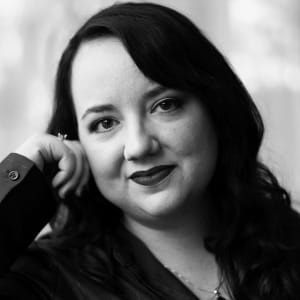
ASHLEE NAEGLE
Wigs, Hair and Makeup Manager & Designer (Las Vegas, NV)
Seattle Opera Debut: Hair and Makeup Intern, Giulio Cesare (’07)
Ashlee Naegle made a name for herself early on in her career by mastering the dying art of wig building. She created and designed for several companies around town until the Seattle Opera created an in-house Hair and Makeup Designer position for her in 2017. During her time as the in-house Hair and Makeup Designer, she has built a sizable wig collection, built a department, and set high standards for wigs, hair and makeup. With each production, her designs are custom built for the performers and their characters to create a believable façade for the audience as well as complement the costumes and production as a whole.

ELIZABETH PETERSON
Isabel
Mezzo-soprano (Burien, WA)
Seattle Opera Debut
Seattle Opera Chorus member since 2012
Previously at Seattle Opera: Mother, Earth to Kenzie (’25); Monkey Queen/Lord Tiger, Monkey and Francine in the City of Tigers (’24)
Engagements: Spirit #6, Cendrillon and Mrs. Herring, Albert Herring (Vashon Opera); La Cieca, La Gioconda (Sky Opera)
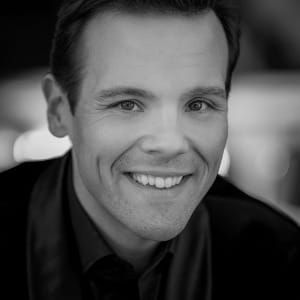
DAVID PORTILLO
Frederic
Tenor (San Antonio, TX)
Seattle Opera Debut
Engagements: Tamino, The Magic Flute (The Metropolitan Opera); Jupiter, Semele (Dutch National Opera & Ballet); Don Ottavio, Don Giovanni (Santa Fe Opera); Lysander, A Midsummer Night’s Dream (Seiji Ozawa Matsumoto Festival); Dr. Richardson, Breaking the Waves (Houston Grand Opera); Septimus, Theodora (Theater an der Wien)

JAMES SCHUETTE
Scenery & Costume Designer (Manitowoc, WI)
Seattle Opera Debut: Costume Designer, Carmen (’04)
Previously at Seattle Opera: Costume Designer, Carmen (’11)
Engagements: Awakenings and Harvey Milk (Opera Theatre of St. Louis); A Christmas Carol (Fisher Center at Bard College); M. Butterfly (Santa Fe Opera); Harvey Milk (Opera Theatre of St. Louis)
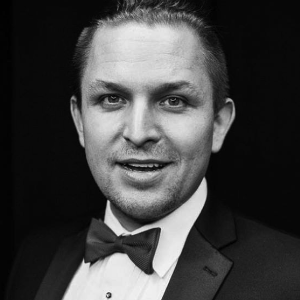
ILYA SILCHUKOU
Samuel
Baritone (Minkus, Belarus)
Seattle Opera Debut: Sciarrone, Tosca (’25)
Engagements: Hunter, Rusalka (Teatro alla Scala); Prince Yeletzky, Queen of Spades (Sofia Opera); Dandini, Cinderella (Sofia Opera, Opéra National de Montpellier); Simeon, L’Enfant Prodigue (Tacoma Opera); Belcore, The Elixir of Love (Théâtre du Capitole de Toulouse)
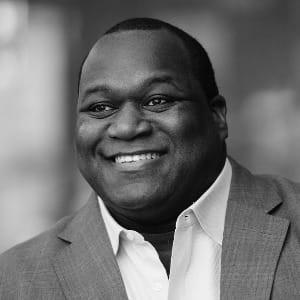
REGINALD SMITH JR.
The Pirate King
Baritone (Atlanta, GA)
Seattle Opera Debut
Engagements: Amonasro, Aida (Baltimore Symphony, Lyric Opera of Chicago); Porgy, Porgy and Bess (Washington National Opera); Scarpia, Tosca (New Orleans Opera); Marcello, La bohème (Opera Memphis); Emile Griffith, Champion (Lyric Opera of Chicago)

NATHAN STARK
Sergeant of Police
Bass-baritone (Turlock, CA)
Seattle Opera Debut
Engagements: Dr. Dulcamara, The Elixir of Love (Opera Modesto); French General, Silent Night (Opera Orlando); Church Councilman, Breaking the Waves (Detroit Opera); Bartolo, The Barber of Seville (Opera Theatre of St. Louis); Reverend Baines, Elmer Gantry (Opera Santa Barbara)

ROBERT WIERZEL
Lighting Designer (Branford, CT)
Previously at Seattle Opera: Jubilee (’24); Blue (’22); Don Giovanni (’21)
Seattle Opera Debut: Turn of the Screw (’94)
Engagements: House Of McQueen (The Mansion at Hudson Yards); Silent Night (Florida Grand Opera); Götterdämmerung (The Atlanta Opera); A Doll’s House (Guthrie Theater); Pagliacci (Minnesota Opera); Madama Butterfly (Glimmerglass Festival)
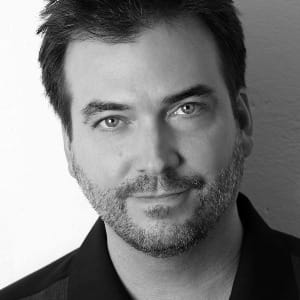
ROBERTSON WITMER
Sound Designer (Seattle, WA)
Seattle Opera Debut: The Falling and the Rising (’19)
Previously at Seattle Opera: Tosca (’25); The Magic Flute (’25); Jubilee (’24)
Engagements: Fancy Dancer (Seattle Rep); Enemy of the People (ACT Contemporary Theatre); Peril in the Alps (Laguna Playhouse)
Chorus
Soprano
Clarice Alfonso
Jennifer Campbell
Karen Early Evans
Ellaina Lewis
Ibidunni Ojikutu
Amy Van Mechelen
Lyndee White
Alto
Lorraine Burdick
Erica Convery
YeonSoo Lee
Elizabeth Peterson
Melissa Plagemann
Bianca Raso
Lucy Weber
Tenor
Hugh Davis
Andrew Etherington
Kenneth Foster
Tim Janecke
Eric Angus Jeffords
Carson Lott
Korland Simmons
Bass
Mark Davies
Craig Grayson
Glenn Guhr
Zachary Martin
Michael Monnikendam
Micah Parker
Julian Reisenthel
Supernumerary
Sue Buske as Queen Victoria
Orchestra
Violin I
Noah Geller, Concertmaster
Helen Kim, Assc. Concertmaster
Eduardo Rios, First Asst. Concertmaster+
Emerson Millar, First Asst. Concertmaster^
Andy Liang, Second Asst Concertmaster^
Jacqueline Audas
Jennifer Bai
Timothy Garland
Leonid Keylin
Ji Yeon Lee
Wayne Lee^
Mikhail Shmidt
Jeannie Wells Yablonsky
Violin II
Elisa Barston, Principal
Cameron Daly, Assc. Principal
Kathleen Boyer, Asst. Principal
Gennady Filimonov
Evan Anderson
Natasha Bazhanov
Brittany Breeden
Stephen Bryant
Xiao-po Fei
Artur Girsky
Seunghoon Lee
Aaron Li
Andrew Yeung
Viola
Sayaka Kokubo, Principal
Katie Liu, Assc. Principal
Mara Gearman, Asst. Principal
Ursula Steele
Olivia Chew
Wesley Dyring
Timothy Hale
Daniel Stone
Rachel Swerdlow
Cello
Efe Baltacıgil, Principal
Meeka DiLorenzo, Assc. Principal
Nathan Chan, Asst. Principal+
Eric Han
Katherine Audas
Roberta Downey
Walter Gray
Vivian Gu
Sunnat Ibragimov
David Sabee
Double Bass
Jordan Anderson, Principal
Joseph Kaufman, Assc. Principal
Will Langlie-Miletich, Asst. Principal
Jonathan Burnstein
Sam Casseday
Jennifer Godfrey
Travis Gore
Flute
Demarre McGill, Principal
Jeffrey Barker, Assc. Principal
Bridget Pei
Oboe
Mary Lynch VanderKolk, Principal
Ben Hausmann, Assc. Principal
Winnie Lai
Stefan Farkas
English Horn
Stefan Farkas, Principal
Clarinet
Benjamin Lulich, Principal
Emil Khudyev, Assc. Principal
Eric Jacobs
Bass Clarinet
Eric Jacobs
Bassoon
Seth Krimsky, Principal
Luke Fieweger, Assc. Principal
Paul Rafanelli
Kipras Mažeika
Contrabassoon
Kipras Mažeika
Horn
Jeffrey Fair, Principal
Mark Robbins, Assc. Principal
Jonathan Karschney, Asst. Principal
Jenna Breen
John Turman
Danielle Kuhlmann
Trumpet
David Gordon, Principal
Alexander White, Assc. Principal
Christopher Stingle
Michael Myers
Trombone
Ko-ichiro Yamamoto, Principal
Carson Keeble
Bass Trombone
Eden Garza
Tuba
John DiCesare, Principal
Timpani
Eric Schweikert, Principal
Matt Decker, Asst. Principal
Percussion
Michael Werner, Principal
Jonathan Wisner
Matt Decker
Harp
Valerie Muzzolini, Principal
Personnel Manager
Constance Aguocha
Assistant Personnel Manager
Keith Higgins
Rotating members of the string section are listed alphabetically.
+ On leave for the 25–26 Season.
^ Temporary position for the 25–26 Season
For production specific orchestra roster visit seattleopera.org/pirates.
Letters
From the General & Artistic Director

Welcome to the opening of our 2025/26 season!
We are very excited to present Seattle Opera’s first ever performance of The Pirates of Penzance. Many of you may be wondering why we are undertaking this operetta for the first time. Well, apart from the fact that this Gilbert and Sullivan high seas romp is nothing short of a masterpiece and has been performed almost nonstop since its creation in 1880, The Pirates of Penzance is one of the most requested titles by our very own Seattle Opera audiences. To bring it to life, we have engaged a top-notch cast of opera artists who have appeared on the finest stages throughout the world. It is an added luxury to have as our orchestral partners the brilliant musicians of the Seattle Symphony led by one of the great interpreters of G&S, David Charles Abell in his company debut. This production by the director-choreographer Seán Curran, also making his Seattle Opera debut, has been seen throughout the United States and has enchanted audiences since its creation at Opera Theatre of St. Louis.
Whether you are a Gilbert and Sullivan groupie or a newcomer to their topsy-turvy style of musical mayhem, I encourage you to sit back and revel in the tuneful silliness of it all.
I have now hit my one-year anniversary as General and Artistic Director of Seattle Opera and I would like to thank you for making me feel so welcome in this extraordinary city. I am deeply grateful for your support and your investment in the cultural and artistic fabric of our community, and I am looking forward to seeing you at the other world-class performances we are offering up this season. These are challenging times for many arts organizations, but I am optimistic about the future of Seattle Opera.
So, thank you again!
As we say in pirate speak: Have a great evening, me mateys. Arrrgh!
Sincerely yours,
James Robinson
General and Artistic Director
From the President
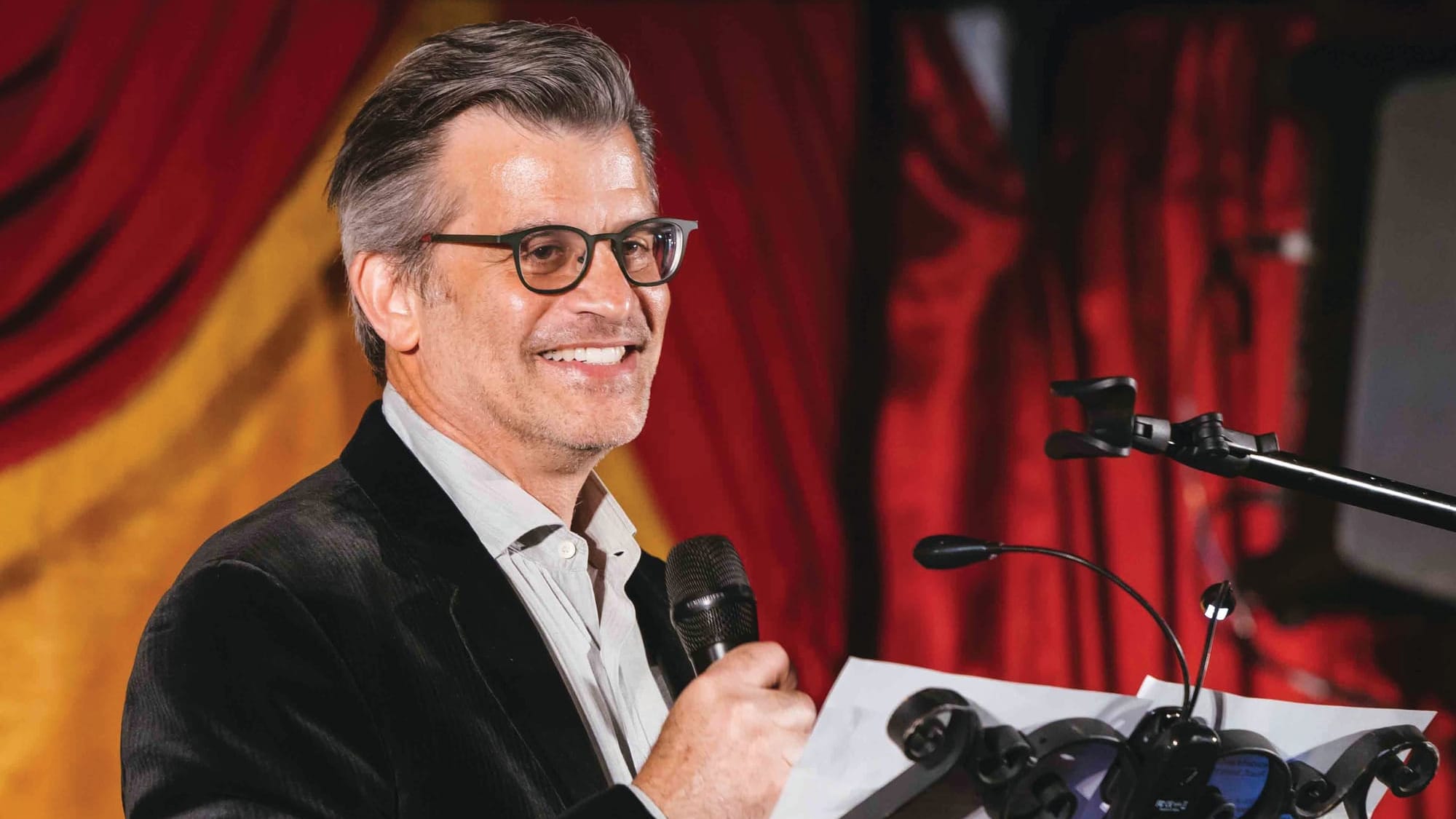
Ahoy, opera mateys, and welcome to Seattle Opera’s 2025/26 season! As the new president of the Board, I’m thrilled to welcome you to McCaw Hall for an exciting milestone—our very first production of a Gilbert and Sullivan opera, The Pirates of Penzance. This season also represents another milestone. It’s the first that showcases the programming and artistic choices of our esteemed General Director, James Robinson, who is now squarely at the helm of this ship. I couldn’t be more excited to be on this journey with him and the rest of our crew!
By way of introduction, I am a lifelong fan, supporter, and practitioner of the performing arts, and have served on the Seattle Opera Board for the last sixteen years. I grew up in a house immersed in the arts, with parents who were professional musicians. As child, I sang in The Metropolitan Opera’s Children’s Chorus and watched my mother play the cello in Beatlemania from the rafters of the Winter Garden Theater in New York City. Over the past two decades, I’ve sung with our very own Seattle Symphony in the Chorale and have had the pleasure of watching my own children perform in Seattle Opera mainstage productions. It’s in the blood!
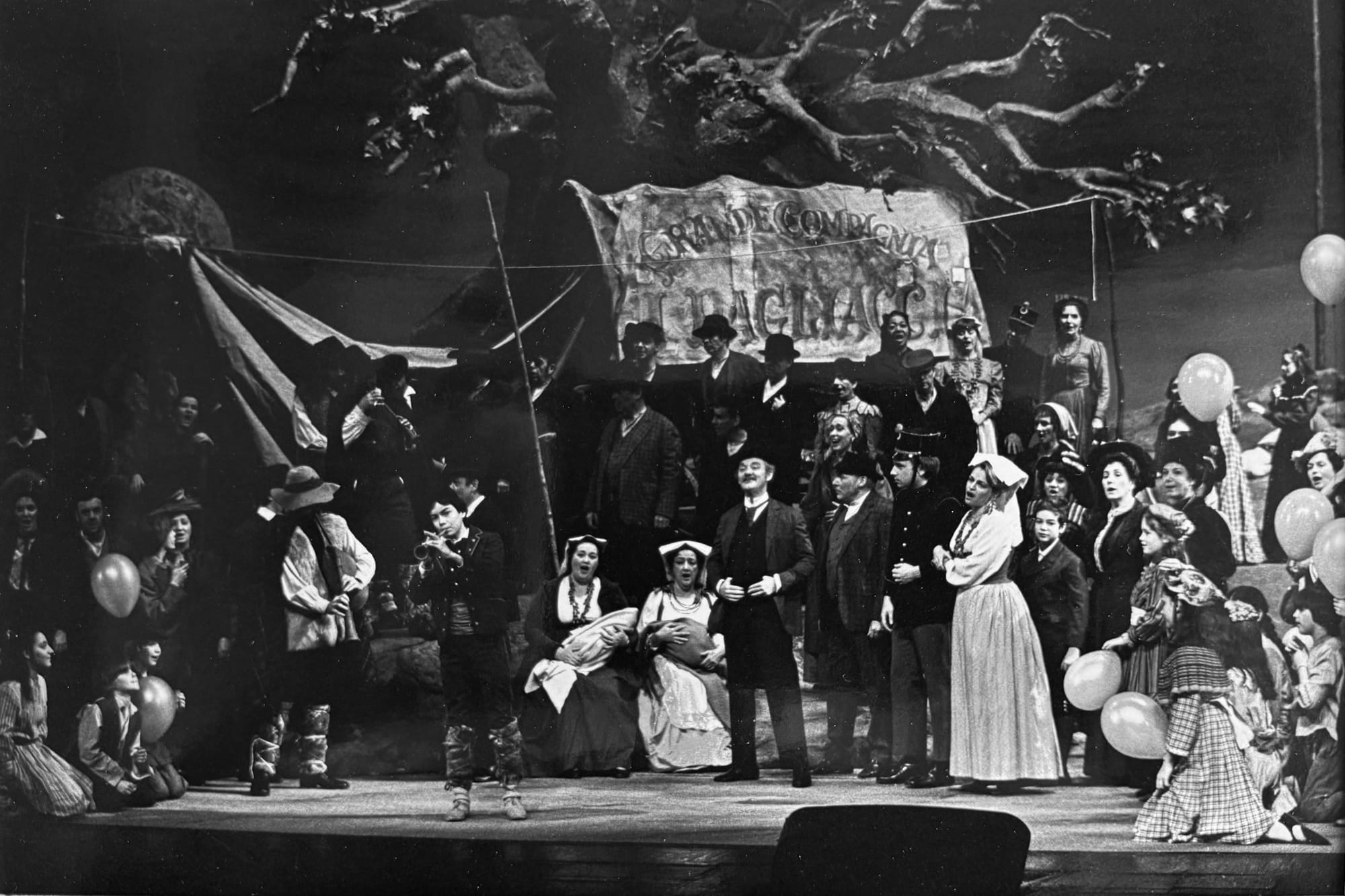
This season promises to be an epic journey filled with bounty, beauty, betrayal, and bloodshed—typical operatic stuff! In addition to our maiden voyage of Pirates, we will feature Daphne in Concert, a lush, orchestral piece by Richard Strauss, the Seattle debut of Fellow Travelers, a timely piece about the Lavender Scare in the 1950s, and our finale, Carmen, with the amazing J’Nai Bridges! It’s going to be a fantastic season, and I hope to see you at many or all of these productions!
From its beginnings under founding director Glynn Ross, Seattle Opera has been a pioneering voice in the opera world, from producing the first Ring Cycle in the United States in several decades, to helping found Opera America, to commissioning new works like A Thousand Splendid Suns and Jubilee. This legacy continues today under James, supported by our exceptional staff and dedicated Board of Directors. We are committed to producing opera of the highest artistic quality, bringing new works and compelling interpretations of the classics, and helping to define the future of this beautiful art form.
Seattle Opera is also a cornerstone of our region’s cultural life and a key part of our arts community. We entertain, engage, educate, and employ—enriching our community and making Seattle a place where people want to live and visit. Ticket revenue covers only a portion of what it takes to produce opera at this scale, which is why your support is vital. Thank you for all you do, and I hope you’ll continue to invest in what we do here at Seattle Opera.
Now, let’s raise the mainsail…umm curtain, and set sail with the Pirate-King, Frederic, Mabel, and Major-General Stanley.
Thank you,
Jonathan Rosoff
President, Seattle Opera Board of Directors
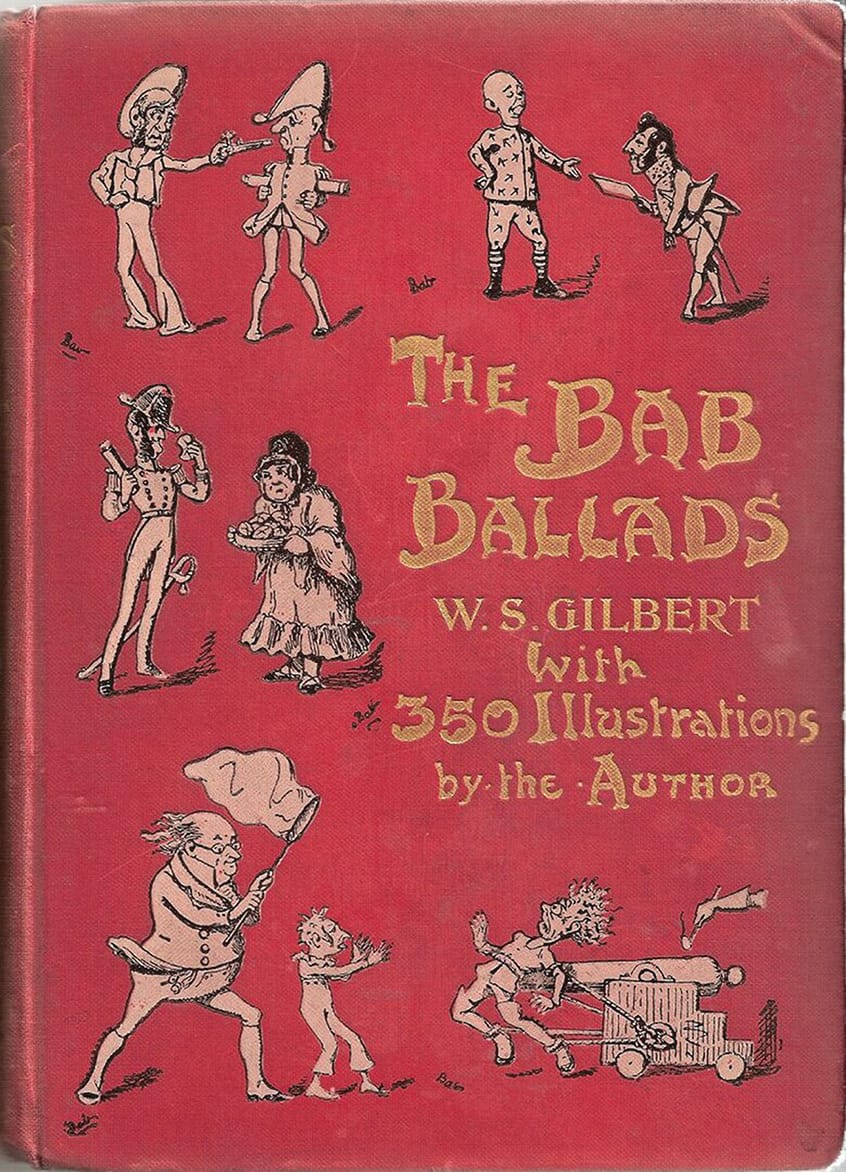
The Gilbert & Sullivan Sweet Spot(s)
By Jonathan Dean
Above: The Bab Ballads, with which are included Songs of a Savoyard, published in the late 19th century by W. S. Gilbert, is a collection of illustrated poems that parody social conventions, amusing situations, and quirky human behavior.
Gilbert and Sullivan? Why is the librettist listed first? Come to think of it, why is the librettist listed at all? Convention dictates that an opera belongs to its composer: it’s Puccini’s Tosca, Strauss’s Daphne, Bizet’s Carmen. Well, that convention —not crediting the librettist—makes some sense if we’re talking about operas performed in languages foreign to most of the audience. When Seattleites come to hear Tosca, Daphne, or Carmen, the words are not the draw. You’re probably not even listening to the words but instead reading how some nincompoop translated them.
But a performance of Gilbert and Sullivan, in America, offers a different kind of experience: here the original words are not only available to the audience, they’re full and chewy and erudite and playful and difficult, rich with rhyme, popping with paradox, personality, and pitiful puns. William Schwenck Gilbert was an opera librettist and then some. As a purveyor of humor, drama, and social criticism in late Victorian England, he was the successor to Charles Dickens. Dickens and Gilbert were huge celebrities; their verbal works were unprecedentedly popular on both sides of the Atlantic.
At least, Gilbert’s writing achieved that kind of popularity—when set to music by Sir Arthur Seymour Sullivan. Their Venn diagram overlap—the intersection of these separate geniuses—was so extraordinary, their creations still delight 150 years later. What about Gilbert without Sullivan, or Sullivan without Gilbert? Both were prolific, and worked on solo projects, or with other collaborators. In the age of Verdi and Wagner’s musical nationalism, Sullivan faced considerable pressure to prove to the world that England was not really “das Land ohne Musik (the land without music)”. He wrote choral, orchestral, and church music (and one non-comic opera, Ivanhoe). But it’s the joint creations of Gilbert and Sullivan that still draw big crowds today.
Opera’s Sweet Spot
What makes their collaboration so effective? As with any opera, G&S shows are a blend of words and music, a power-couple whose partners don’t always play nicely together. Words and music are a bit like oil and vinegar: mix them up all you want, eventually they will separate out. Opera is easier when the words are over here and the music over there. Text-first modes include spoken dialogue, talky recitative, and break-neck patter songs. But, music comes first in the overture, orchestral interludes, those vocally showy bel canto flourishes, and the big ensembles where everybody’s singing different words at the same time, so comprehension goes by the wayside.
When text and music take turns dominating, it’s easier to rehearse. But who said opera should be easy? Great opera is what chemists might call a “colloidal suspension,” where words and music are truly fused. When you can no longer separate, or evaluate, words apart from music, you’ve reached opera’s sweet spot.
With many of the world’s favorite operas, that fusion was achieved when overbearing composers (such as Verdi or Puccini) micromanaged the work of compliant librettists. In such situations a librettist is a bit like a screenwriter: the words provide a foundation, but what’s built atop the words is the main event—an opera’s music, a film’s cinematography or acting.
But Gilbert was not compliant, and Sullivan was not a micromanager. Typically, Gilbert would present his composer with a finished libretto, and Sullivan would dutifully set the whole thing to music, including nondescript music when that was required. In a patter song, for example, the words are so intense and prolific the music mustn’t compete for attention.
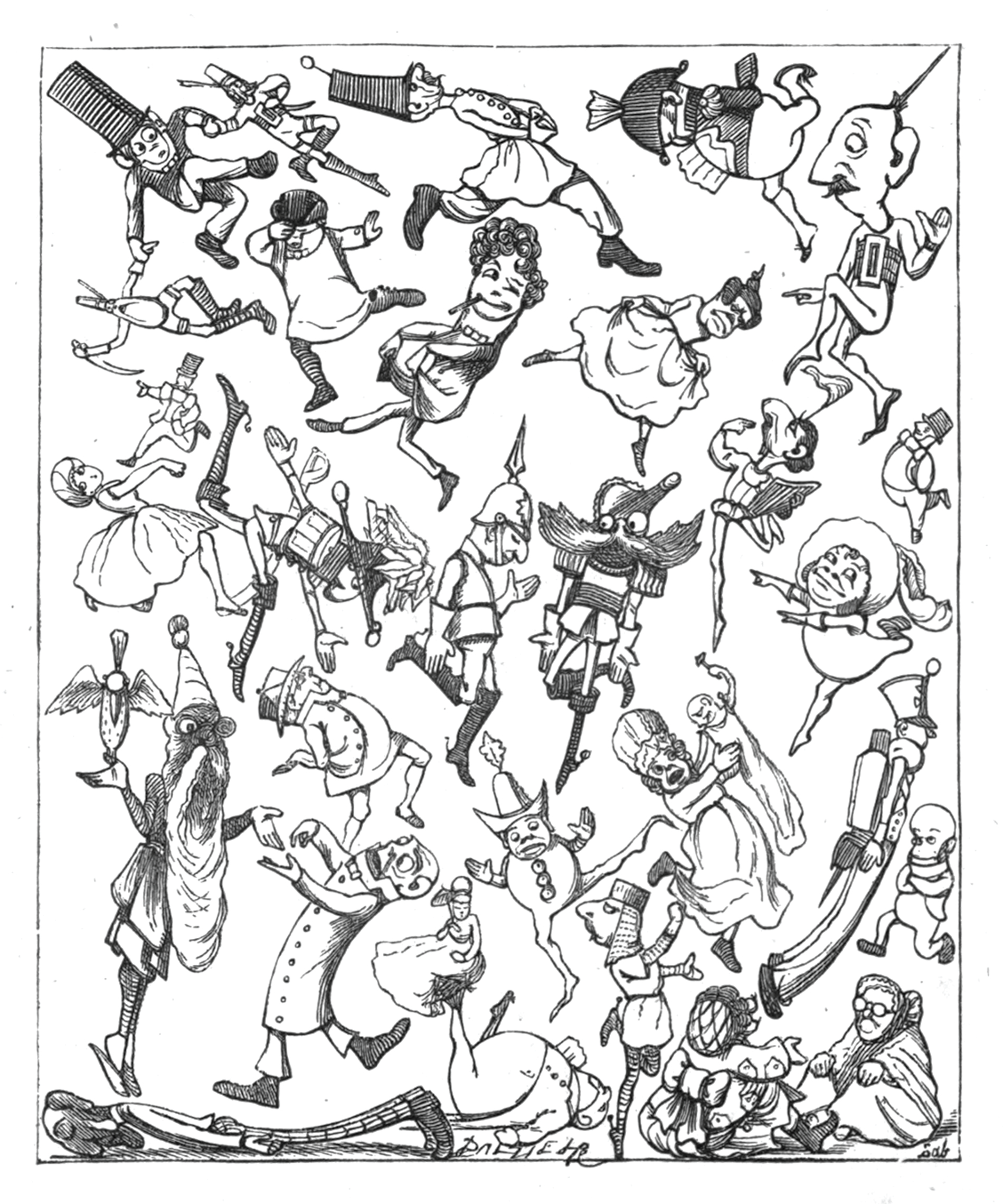
The Pirates of Penzance was the fifth of the fourteen Gilbert and Sullivan collaborations, and by this point the pair had figured out how to activate their wonder-twin powers and find their sweet spot. It happens when Sullivan’s music adds to Gilbert’s words, kicks them into the next dimension. Yes, Gilbert wrote Mabel a good line for when she offers Frederic her love: “Poor, wandering one! / If such poor love as mine / Can help thee find / True peace of mind, / Why, take it, it is thine!” But that line wouldn’t be nearly so memorable without the catchy waltz tune Sullivan invented for it, which automatically underlines the significant words while flirting and dancing with the lad. Words, music, and drama all in sync—that’s the sweet spot, and they nailed it in song after song, show after show.
There’s also a sweet spot in terms of humor. Gilbert’s libretto for The Pirates of Penzance ridicules incompetent pirates, timid police, men, women, Italian opera, the British military…he even gives us a tongue-in-cheek deus ex machina ending, mocking the British tendency to worship Queen and Parliament. When a jester goes around making fun of absolutely everyone and everything, at some point it becomes off-putting. Balance is provided by the warm humanity of Sullivan’s music.
For Gilbert’s topsy-turvy comedy to work, the characters must not find themselves or their situations funny. If they do, we won’t. The music, while helping the audience laugh, at the same time paradoxically helps the performers take the absurd situations seriously.
The words don’t work without the music; the music doesn’t work without the words. But together the voice of Gilbert and Sullivan is so strong, they could write a show, even a silly spoof, that continues to enchant long after everyone has forgotten all about whatever it was originally spoofing. When comedy replaces reality—now that's the ultimate sweet spot.
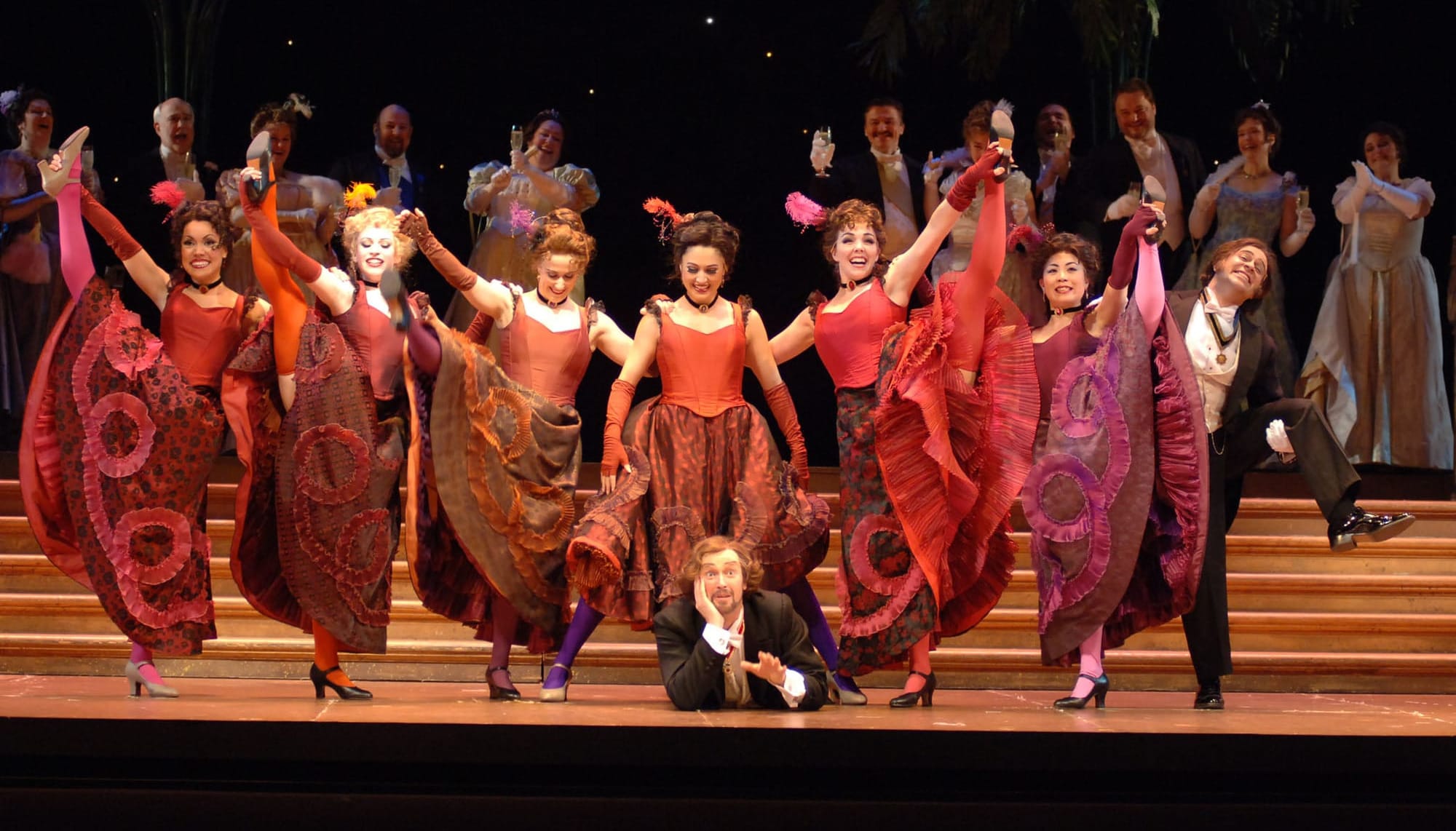
There’s No Such Thing as Operetta
By Joshua Gailey
Above: Seattle Opera's 2006 production of Johann Strauss's operetta Die Fledermaus.
There’s a famous aphorism attributed to the evolutionary biologist Stephen Jay Gould: “there’s no such thing as a fish.” Though provocatively phrased, Gould’s point is simple: despite the usefulness of the term in our everyday lives, there is no strictly biological definition of what constitutes a fish. From an evolutionary perspective, some of the creatures we call “fish,” like starfish or jellyfish, have less in common with salmon than camels.
The same might be said of musical genres. We put a lot of stake in genres: they influence our personalities, the friends we hang out with, the clothes we wear. While we may know better than to judge a book by its cover, we gladly judge it based on its genre, especially when it comes to “low” ones like romance or horror. But when you start looking more closely, it becomes difficult to tell where the line should be drawn between this genre and that.
The works of Gilbert and Sullivan, paragons of operetta, are a perfect example. Literally “little opera,” operetta has long been maligned as frivolous, amateur, or inconsequential compared to its more “respectable” cousin. Gilbert and Sullivan themselves were aware of these associations and thus avoided using the term, preferring to call their works either “comic operas” (evoking more artistic aspirations) or “Savoy operas” (in a savvy bit of branding promoting the Savoy Theatre where they were performed). Composer Arthur Sullivan was especially bothered by operetta’s reputation among the elite, and later in his career turned, quite unsuccessfully in the eyes of critics, to grand opera and oratorio, then the most prestigious genres in England.
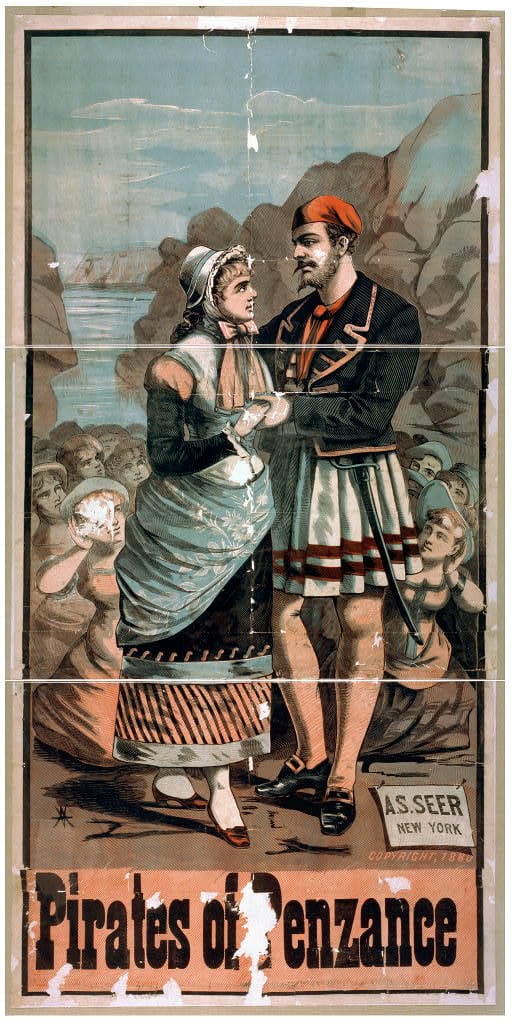
The Operetta Craze
It’s only in retrospect that the term “operetta” has been applied to Gilbert and Sullivan, to place their works in a lineage of theatrical spoofs from the last half of the 19th century that mocked opera itself. The term originated in Paris in the 1840s, when a musician known as Hervé began producing little one-act burlesques he called vaudevilles-opérettes and parodies-opérettes. The genre as we know it, however, coalesced with Jacques Offenbach, who in 1855 started referring to his immensely popular parodies, like Orpheus in the Underworld (1858), as opérettes. This was a time when opera was becoming increasingly pompous—think of the imposing music dramas of Richard Wagner, the hulking grand operas of Giacomo Meyerbeer, or the ambitious tragedies of Giuseppe Verdi. Operetta mocked these works mercilessly, taking aim at their contrived plots, their tedious conventions, and, above all, their flamboyant self-importance.
It was a winning formula. Offenbach’s nearly 100 operettas sparked a flurry of imitations, and soon enough new epicenters for operetta cropped up across Europe. The first was Vienna, where composers like Franz von Suppé and the “Waltz King,” Johann Strauss, developed their own Viennese versions, called komische Operette. Some of these pieces, like Strauss’s Die Fledermaus (1874), are still frequently seen on opera stages. The second, of course, was London, where in 1875 the impresario Richard D’Oyly Carte commissioned William S. Gilbert, a staff writer for Fun magazine (a sort of Victorian equivalent of Mad magazine), and Arthur Sullivan, director of the school that later became the Royal College of Music, to create a one-act operetta, Trial by Jury, to pair with Offenbach’s La Périchole.
Opera vs. Operetta
So what sets operetta apart from opera? Well, much like for Gould’s fish, it’s tough to come up with universal truths. One might say operetta’s mixture of tunes with spoken dialogue makes it unique; but then what do we make of Carmen or The Magic Flute, which feature the same? Perhaps it’s that operettas are shorter than operas, or less serious in tone? No, Pagliacci clocks in 15 minutes shorter than The Pirates of Penzance, and The Barber of Seville is just as goofy. Surely, then, it’s the fact that operetta takes opera itself as its subject of parody? Yet even here there’s precedent in the very origins of comic opera in the early 18th century, when little spoofs on opera called intermezzi (like Pergolesi’s La serva padrona from 1733) were peppered in the breaks between acts of a serious opera.
If there’s one characteristic that might hold true, it’s that operetta was more nakedly commercial than 19th-century opera. While Verdi and Wagner were writing increasingly complex music for state-sponsored (or eventually, in Wagner’s case, personal) theaters, operetta played in for-profit houses with promotional tie-ins and catchy tunes that aimed shamelessly for the sheet-music market. This legacy of commercialism is continued by the American musical, for which operetta, and especially Gilbert and Sullivan, provided the blueprint.
Ultimately, opera and operetta (and the musical, for that matter) are not all that different. Each tells stories on stage through music, and it’s equally common these days to see operettas produced at opera houses or commercial theaters. Thinking about genre helps us understand the contexts in which these works were produced, but we shouldn’t allow the baggage that comes along with it to dictate our listening habits. Opening our ears to the connections between musical traditions reveals a deeper appreciation for how art creates meaning in our lives. After all, there are many fish in the sea—no matter what we call them.
Upcoming Events
GILBERT & SULLIVAN SONGBOOK
The Opera Center
Thursday, Oct. 23, at 7:30 PM
Tickets: $34 Subscribers; $39 General Public
Join us for tongue-twisting patter, light-hearted love songs, and more! Celebrate the wit and whimsy of Gilbert and Sullivan (plus more favorites from their American cousins!) in an evening of comedy and toe-tapping tunes, including favorites from titles like The Pirates of Penzance, HMS Pinafore, and The Gondoliers. Curated by conductor and Gilbert and Sullivan specialist David Charles Abell and performed by cast members of The Pirates of Penzance.
seattleopera.org/songbook
PATRICIA SINGS PIAF
The Opera Center
Saturday, Nov. 22, at 7:30 PM
Tickets: $34 for Subscribers
Grammy Award-winning soprano Patricia Racette performs songs of famous French cabaret singer Édith Piaf. Joined by pianist and arranger Craig Terry, this “unforgettable evening concert” (The Daily Californian) offers a sensuous program of love and heartbreak with tunes like “La Vie en rose,” “Hymne à l’amour,” and many more.
seattleopera.org/piaf
Limited tickets available. Please call Audience Services for availability.
21ST-CENTURY OPERA
Tuesdays, Oct. 21 – Nov. 25, at 6:30 – 8:00 PM (6 ZOOM SESSIONS)
$150 Sliding Scale Fee or 1 Flex Pass Credit
Learn more about contemporary opera in a class led by Seattle Opera dramaturg Jonathan Dean. Spanning a large range of topics and musical styles, this class will deepen participants’ knowledge of the recent surge of operatic creativity.
seattleopera.org/21stcentury
BLACK ARTISTS MARKET
The Opera Center
Saturday, Dec. 6, at 11:00 AM – 5:00 PM
Free
Join us for our holiday craft market featuring an array of unique treasures from Black artists, artisans, and Black-owned small businesses. Thoughtfully curated in partnership with Intentionalist, ARTE NOIR, and Wa Na Wari, discover handmade gifts, one-of-a-kind decorations, and delectable treats, all while supporting local artistry and celebrating community.
seattleopera.org/market
ANITA SPRITZER’S GAY APPAREL
The Opera Center
Relaxed Performance: Thursday, Dec. 11 at 7:30 PM
Friday – Saturday, Dec. 12 – 13, at 7:30 PM
Celebrate the holidays with the one and only Anita Spritzer! Tenor John Marzano (Pagliacci ’24; Divo to Diva: Anita Spritzer in Recital ’24; BRAVO! Halloween Party ’24, ’23; Alcina ’23) as his drag persona Anita Spritzer, get ready to don your gayest apparel and join one of Seattle’s favorite drag queens as she sings holiday favorites and celebrates the glitter and glitz of the festive winter season.
seattleopera.org/gayapparel
YOUTH OPERA PROJECT
The Opera Center
Thursday, Jan. 8 – Sunday, Mar. 15, 2026
$960 and financial assistance is available
Youth ages 7 – 18 will set sail on an unforgettable hero’s journey into the land of Greek mythology with this season’s Youth Opera Project production of Odyssey by Ben Moore and Kelley Rourke. Youth Opera Project offers youth performers a chance to take center stage at the Opera Center to learn, rehearse, and perform a fully staged, fully produced youth opera. No prior experience necessary.
seattleopera.org/yop
QUEERNESS AND OPERA
Tuesdays, Jan. 13 – Feb. 10, 2026 (5 ZOOM SESSIONS)
$150 Sliding Scale Fee or 1 Flex Pass Credit
From queer composers such as Britten and Tchaikovsky, to gender-expansive traditions in opera and queer interpretations of traditional opera, learn more about the long-standing role of queerness in opera both historically and today.
seattleopera.org/queeropera
SONGS OF PRIDE
The Opera Center
Friday, Jan. 30, 2026 at 7:00 PM
Tickets: $34 Subscribers; $39 General Public
Celebrate Pride at the Opera Center with a recital featuring members of the Fellow Travelers cast. Curated by conductor Patrick Summers, artists will perform a wide range of selections from past and present that honor and celebrate the queer and LGBTQ community of Seattle.
seattleopera.org/pride
The performance will be broadcast LIVE on Classical King FM as part of the station’s Northwest Focus LIVE performance series.
Print Edition
